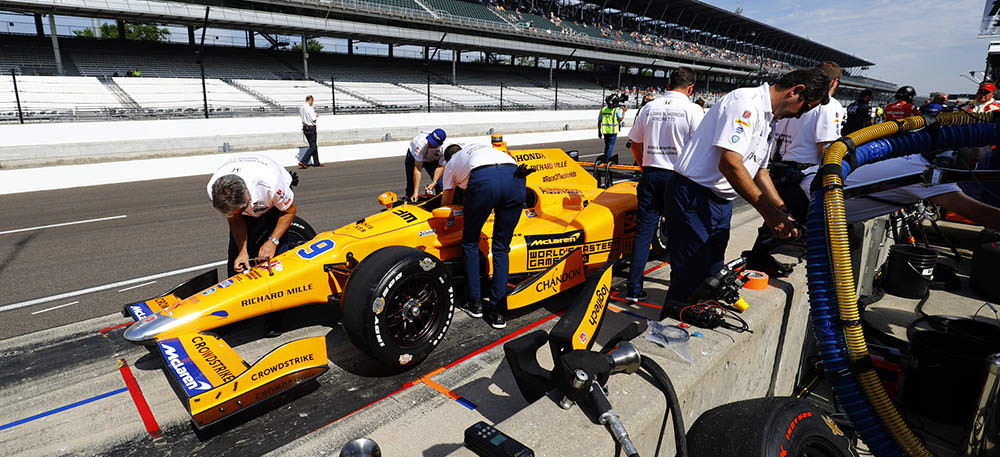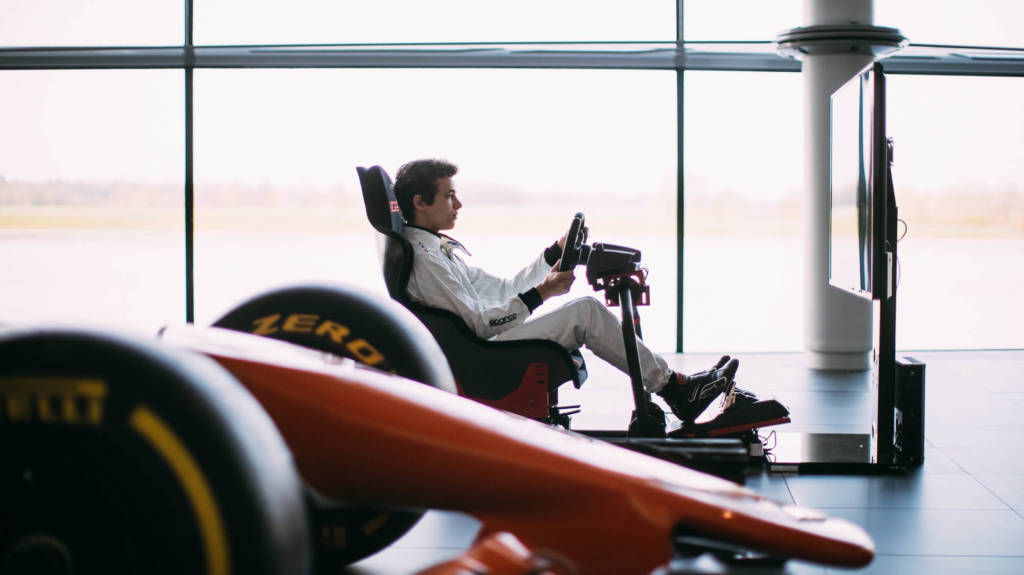McLaren surprised the gaming world in May when it announced that it was partnering with Logitech G, racing apparel and simulation brand Sparco and the GiveMeSport media platform to enter into the esports space with a new competition series called World’s Fastest Gamer.
The competition is the brainchild of Darren Cox, founder of IDEAS+CARS, who has spent over 20 years promoting the automotive industry through gaming events such as the Nissan GT Academy, esports and other creative initiatives, now complemented with an unorthodox approach toward esports. McLaren’s competition will feature a spread of games across multiple platforms—including mobile, consoles and PC—using different games that include McLaren cars in them. Its most recent addition is the mobile game Gear.Club, and the person who masters racing across all the diverse platforms wins a job at McLaren driving its Formula 1 simulator.

“The growth of esports is well documented, but one thing that slips under the radar is the size of the racing community because it is so diverse,” Cox told AlistDaily. “We’ve seen a huge amount of interest and investment in soccer over the last year, and I think the next great area is going to be motorsports.”
Cox said that he’s seen strong growth in what he calls “unreal esports,” which includes games such as Dota 2, League of Legends and more. But the recent expansion of traditional sports such as American football, soccer and basketball into esports convinced him that now is the time for motorsports to take its place in gaming. However, motorsports faces some unique challenges.
“For a number of years, motor racing has had a huge market on gaming consoles, PC and mobile, but it’s been relatively untapped in terms of potential,” said Cox. “One of the reasons for that is, unlike something like soccer, where FIFA is the dominant source for gaming or Madden for American football, racing is spread across many titles like Forza or Gran Turismo on consoles, something like iRacing on PC and Real Racing on mobile. There isn’t one dominant game for the racing genre.”
Cox then went into detail about how the World’s Fastest Gamer competition came together and how it will grow esports, the McLaren brand and motorsports in general.
What inspired the McLaren World’s Fastest Gamer competition?
The idea behind it is finding the champion of champions. There are many debates on forums and communities across the internet which will discuss whether one favorite game is better than another one. Normally, competitions have been held on one specific platform, and we’ve never had a chance to find out which game is the champion of champions. So, we set out to bring all of those diverse games together to find out what the best of the best is. The great thing about it is that it’s got probably the best prize in esports, which is a year’s contract to work at McLaren’s Formula 1 factory in the UK as a simulator driver helping out the Formula 1 team as they performance engineer their race car.
How did the competition come together?
I’ve had a relationship with a number of people from McLaren over the years, and Zak Brown, the new executive director of the Formula 1 team, and I have worked on a number of projects. I went to them with this concept and we quickly signed a deal to make this happen. Zak is changing a lot of things at McLaren, and one of those things is letting driver Fernando Alonso race in the Indianapolis 500. He’s doing things differently from the traditional approach of Formula 1 teams, and despite how Formula 1 is a technologically advanced and an innovative sport, it can sometimes be very conservative in the ways it goes to market and attracts fans.
McLaren is changing that and that’s why they decided to commit to World’s Fastest Gamer and be the first Formula 1 team to be heavily involved in gaming, despite the fact that gaming is a huge part of the fans’ interaction with motorsports. We’ve got everything from mobile through to PC, and all the games are being played with McLaren products. For them, it’s a fantastic marketing tool—not just for the content of gamers being seen in a McLaren environment, but also because their cars are being driven virtually by thousands of gamers that may not have previously. I think that everyone in the motor industry is now seeing gaming as a valuable marketing tool instead of as just a way of deriving license fees.
What led to the inclusion of Gear.Club, and how do you get over the huge differences between the mobile, console and PC platforms?
That’s the beauty of the competition. Formula 1 is and has been very exclusive, as is esports in a way. When you look at some of the esports, you need a high-end PC and a very good keyboard, mouse or controller. McLaren and I wanted to democratize motorsports. We wanted to make this as accessible as possible, and not just from a cost point of view, but from a geographical one. There are parts of the world where you can’t compete in esports because they lack the internet bandwidth. So, we spoke to a number of different mobile game licensees, and Gear.Club—a newcomer to the space—was willing to use this platform and project as a marketing tool. We’re excited to have an accessible game like Gear.Club played alongside rFactor 2, which is seen as one of the best simulators on the PC. Whatever your focus is in the racing world, you’ve got access to one of the world’s greatest sports.
Besides the fact that they have McLaren cars in them, what goes into choosing these games?
I would say an open mind, because it’s the first year and no one knows how these sorts of projects will pan out. It’s great to have such a strong brand like McLaren to back it, but year one of any project is always a test. Everyone we’re working with has an open mindset and they’re looking at different ways to improve the project. In year one, we can’t give you a bunch of stats like KPIs, but we can explain the five-year vision of where this is going, and those with open minds have committed very early to it.

What is the long-term goal in targeting gamers with the competition?
It’s to open both McLaren and motorsports to a new audience. We had a study with a partner site a couple of years ago that indicated that about 78 percent of gamers found motorsports through gaming. As we know from studies in other sports such as major league soccer, the younger generations are finding sports through gaming rather than their local soccer fields, race tracks or athletics tracks—they’re discovering in a different way. McLaren has seen that the average age of racing fans is going up, it wants to get to a new audience, and they’ve made a big commitment to be in this area.
A side benefit of that is that their cars are being driven through virtual test drives. Now, I don’t think anyone is saying that anyone is going to buy a McLaren car off the back of World’s Fastest Gamer, but there is some data that suggests that the McLaren brand went up significantly when one of its cars was featured on the cover of a Forza game. You can become affiliated with a brand through gaming. Perhaps having McLaren seen as an innovative brand will bring it to the attention of people who can afford the cars.
What is the relationship between high-end car brands and gamers, many of whom may not be able to afford them?
It’s an interesting space, and we know that many other car brands are getting further involved in gaming. Porsche had a recent partnership with Forza at Le Mans, where roughly 100 gamers were flown there to race virtually while the real Le Mans 24 Hours was on. Audi has also had competitions on Forza. So, we’re looking at the high-end brands, knowing that they need to be in this space for the future and because they know that their current consumers are gamers. We know that some people spend tens of thousands of dollars on gaming rigs, so the dynamics and demographics of gamers are changing dramatically.
A number of brands have even used gaming to launch cars. BMW is launching the 6-series in Gran Turismo before it launches in the real world this fall. Like I said before, car manufacturers once saw gaming as an income stream that was a profitable sideline to their normal business, but the switch is coming where brands want their cars to be in certain games, and they work closely with publishers to make sure they’re front and center. I can see the license fee model changing, where certain games will be able to charge the other way around—offering premium position for car brands. That’s how important gaming is to the car industry.
How have you been getting the word out about this global multiplatform competition?
This is a multi-year deal, so we haven’t gone hard in the beginning—we’re building it very organically. Our main outlets are the McLaren social media sites, and they have millions of followers across Facebook, Twitter and Instagram. They’re pushing this story to their current fans. We have an excellent media partner called GiveMeSport, which is the biggest sports publisher on Facebook with 26 million fans and they’ve been carrying all of our content. So, at the moment, we’re just doing introductory content about the gamers that have gotten through to the finals and what the competition is all about.
We’ll be livestreaming the main qualifiers next month across Facebook Live, YouTube and Twitch, but the main piece of content will be the finals in late October, early November at McLaren’s. We’ll have short-form content, livestreaming and we’ll have a long-form documentary style piece about the competition and the winner. It’s 100 percent digital first because we know that’s where our audience is, it’s where gamers are and it’s where car fans are today. We haven’t done any broadcasting with traditional channels, so everything is rights free and free to access. We’re also engaging with individual gaming communities that exist around Gran Turismo, Forza, Project Cars and others.

